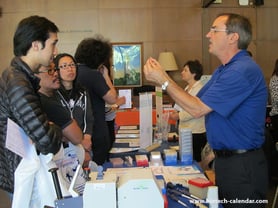A $3.8 million award from the U.S. Department of Defense (DOD) gives researchers at the Gates Center for Regenerative Medicine on the University of Colorado Anschutz Medical Center campus the opportunity to move into the manufacture of stem cell-created skin grafts.

(Image of Epidermolysis Bullosa courtesy of Mostafameraji via Wikimedia)
According to an article for CU Anschutz Today, researchers announced the development of an approach to reprogram a patient’s diseased skin cells into stem cells. This DOD funding will allow scientists to investigate the manufacturing processes for larger-scale production of stem cell-created skin grafts at the Gates Biomanufacturing facility on the Colorado campus.
The goal is to move the technology from the laboratory into clinical trials and, hopefully, find cures for incurable diseases like Epidermolysis Bullosa (EB), a group of inherited skin diseases that result in severe blistering and scarring.
“We are very excited to receive such a strong endorsement from the U.S. Department of Defense,” Ganna Bilousova, PhD., assistant professor of Dermatology at the CU School of Medicine and member of the EB Consortium, stated. “It is extremely difficult to advance any type of novel therapies into the clinic without the benefit of compelling government interest and support.”
Besides, the DOD award, the EB Consortium is funded by the U.S.-based EB Research Partnership (EBRP), EB Medical Research Foundation (EBMRF) and the Sohana Research Fund from Great Britain.
The Gates Center Director, Dennis Roop, PhD. is also a member of the team conducting research on inherited skin diseases and has had a long-standing interest in finding a cure for EB. Since the establishment of the Gates Center for Regenerative Medicine in 2007, Roop has envisioned the creation of a facility “that would allow the translation of basic research into therapies that would benefit patients. The Gates Biomanufacturing Facility has now brought this dream to fruition. My new dream is that this is only the beginning.”
Joining Roop and Bilousova on the research team is Dr. Igor Kogut, PhD.
According to another article in CU Anschutz Today, this May the Gates Biomanufacturing Facility announced the manufacture of its first clinical trial grade product for direct infusion into patients. Materials for the clinical trial in multiple myeloma treatment will now be followed by clinical trial processing at the Gates Center.
Since 2017, the facility has been conducting a separate trial of growing reengineered chimeric antigen receptor T cells (CAR-T) by the millions, then shipping them back to hospital clinicians, who infuse them back into the patient. The newly weaponized T-cells grow and expand in the patient with the result of fighting off the cancer.
The Gates Center for Regenerative Medicine was established in 2006 through a gift in memory of Denver industrialist and philanthropist Charles C. Gates.
In addition to CU Anschutz, the grant for the EB IPS Cell Consortium funds research teams from Stanford University School of Medicine and Columbia University Medical Center. The Consortium is funded by the U.S.-based EB Research Partnership, EB Medical Research Foundation and the Sohana Research Fund from Great Britain.
This DOD grant follows awards from the 21st Century Cures Act and the California Institute of Regenerative Medicine to the same investigators.
Looking to promote and market your lab supply products in this lucrative and prominent life science market?
Biotechnology Calendar, Inc. will be hosting their 9th Annual BioResearch Product Faire™ on Thursday,July 19, 2018. This event will include principal investigators, lab managers, professors, postdocs, grad students, and purchasing agents. This is a unique opportunity to make key sales and create integral connections with high-profile researchers.
To learn more about attending the CU Anschutz event, call (530) 272 - 6675 or click on one of the buttons below:
|
RELATED ARTICLES: UC Anschutz Expands With Gates Biomanufacturing Facility CU Anschutz Receives 5-Year, $46.5 Million NIH Grant Colorado Researchers Receive $5.5M to Study Cannabis and Genetics |




